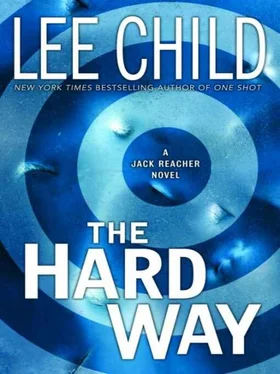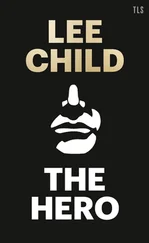“I did everything they asked,” Lane said, to nobody except himself.
Nobody replied.
The lone man surprised his temporary guests by moving toward the window, not the door. Then he surprised them more by using his fingernails to pick at the duct tape seam that held the cloth over the glass. He peeled the tape away from the wall until he was able to fold back a narrow rectangle of fabric and reveal a tall slim sliver of New York City at night. The famous view. A hundred thousand lit windows glittering against the darkness like tiny diamonds on a field of black velvet. Like nowhere else in the world.
He said, “I know you love it.”
Then he said, “But say goodbye to it.”
Then he said, “Because you’re never going to see it again.”
Halfway through the second hour Lane looked at Reacher and said, “There’s food in the kitchen, if you want some.” Then he smiled a thin humorless smile and said, “Or to be technically accurate there’s food in the kitchen whether you want some or not.”
Reacher didn’t want food. He wasn’t hungry. He had eaten a hot dog not long before. But he wanted to get the hell out of the living room. That was for sure. The atmosphere was like eight men sitting around a deathbed. He stood up.
“Thanks,” he said.
He walked quietly into the kitchen. Nobody followed him. There were dirty plates and a dozen open containers of Chinese food on the countertop. Half-eaten and cold and pungent and congealed. He left them alone and sat on a stool. Glanced to his right at the open office door. He could see the photographs on the desk. Anne Lane, identical to her sister Patti. Kate Lane, gazing fondly at the child that had been cut out of the picture.
He listened hard. No sound from the living room. Nobody coming. He got off the stool and stepped inside the office. Stood still for a moment. Desk, computer, fax machine, phones, file cabinets, shelves .
He started with the shelves.
There were maybe eighteen linear feet of them. There were phone books on them, and manuals for firearms, and a one-volume history of Argentina, and a book called Glock: The New Wave in Combat Handguns , and an alarm clock, and mugs full of pens and pencils, and an atlas of the world. The atlas was old. The Soviet Union was still in it. And Yugoslavia. Some of the African countries still had their former colonial identities. Next to the atlas there was a fat Rolodex full of five hundred index cards with names and phone numbers and MOS codes on them. Military Occupational Specialties . Most of them were 11-Bravo. Infantry. Combat arms. At random Reacher flipped to G and looked for Carter Groom. Not there. Then B for Burke. Not there, either. So clearly this was the B-team candidate pool. Some names had black lines through them with KIA or MIA notations written on the corners of the cards. Killed in Action, Missing in Action . But the rest of the names were still in the game. Nearly five hundred guys, and maybe some women, ready and available and looking for work.
Reacher put the Rolodex back and touched the computer mouse. The hard drive started up and a dialog box on the screen asked for a password. Reacher glanced at the open door and tried Kate . Access was denied. He tried O5LaneE for Colonel Edward Lane. Same result. Access denied. He shrugged and gave it up. The password was probably the guy’s birthday or his old service number or the name of his high school football team. No way of knowing, without further research.
He moved on to the file cabinets.
There were four of them, standard store-bought items made of painted steel. Maybe thirty inches high. Two drawers in each of them. Eight drawers total. Unlabeled. Unlocked. He stood still and listened again and then slid the first drawer open. It moved quietly on ball bearing runners. It had twin hanging rails with six file dividers made of thin yellow cardboard slung between them. All six were full of paperwork. Reacher used his thumb and riffed through. Glanced down, obliquely. Financial records. Money moving in and out. No amount bigger than six figures and none smaller than four. Otherwise, incomprehensible. He closed the drawer.
He opened the bottom drawer on the left. Same hanging rails. Same yellow dividers. But they were bulky with the kind of big plastic wallets that come in the glove boxes of new cars. Instruction books, warranty certificates, service records. Titles. Insurance invoices. BMW, Mercedes Benz, BMW, Jaguar, Mercedes Benz, Land Rover. Some had valet keys in see-through plastic envelopes. Some had spare keys and remote fobs on the kind of promotional keyrings that dealers give away. There were EZ-Pass toll records. Receipts from gas stations. Business cards from salesmen and service managers.
Reacher closed the drawer. Glanced back at the door. Saw Burke standing there, silent, just watching him.
BURKE DIDN’T SPEAKfor a long moment. Then he said, “I’m going for a walk.”
“OK,” Reacher said.
Burke said nothing back.
“You want company?” Reacher asked.
Burke glanced at the computer screen. Then down at the file drawers.
“I’ll keep you company,” Reacher said.
Burke just shrugged. Reacher followed him out through the kitchen. Through the foyer. Lane glanced at them from the living room, briefly, preoccupied with his thoughts. He didn’t say anything. Reacher followed Burke out to the corridor. They rode down in the elevator in silence. Stepped out to the street and turned east toward Central Park. Reacher looked up at Patti Joseph’s window. It was dark. The room behind it was unlit. Therefore she was alone. He pictured her in the chair behind the sill, in the gloom. Pictured her pen scratching on her pad of paper. 2327 hrs., Burke and Venti leave TDA on foot, head east toward Central Park . Or CP . A person who wrote TDA for the Dakota would write CP for Central Park, surely. And maybe she had dropped Venti and was using his real name now. He had told her what it was. Maybe she had written Burke and Reacher leave TDA .
Or maybe she was asleep. She had to sleep sometime.
“That question you asked,” Burke said.
“What question?” Reacher said.
“Who knew Mrs. Lane loved Bloomingdale’s?”
“What about it?”
“It was a good question,” Burke said.
“What’s the answer?”
“There’s another question,” Burke said.
“Which is?”
“Who knew she was heading there that particular morning?”
“I’m assuming you all knew,” Reacher said.
“Yes, I guess we all did, more or less.”
“Therefore it’s not much of a question.”
“I think there’s inside involvement,” Burke said. “Somebody tipped somebody off.”
“Was it you?”
“No.”
Reacher stopped at the crosswalk on Central Park West. Burke stopped beside him. He was as black as coal, a small man, about the size and shape of an old-fashioned Major League second baseman. A Hall of Famer. Like Joe Morgan. He had the same physical self-confidence in the way he held himself.
The light changed. The upright red hand blinked out and the forward-leaning white man came on. Reacher had always regretted the switch from the words WALK and DONT WALK . Given the choice, he preferred words to pictograms. And as a kid he had been scandalized by the bad punctuation. Ten thousand missing apostrophes in every city in America. It had been a secret thrill, to know better.
He stepped off the curb.
“What happened after Anne?” he asked.
“With the four guys who took her?” Burke said. “That’s strictly need-to-know.”
“I’m guessing you helped out.”
Читать дальше












